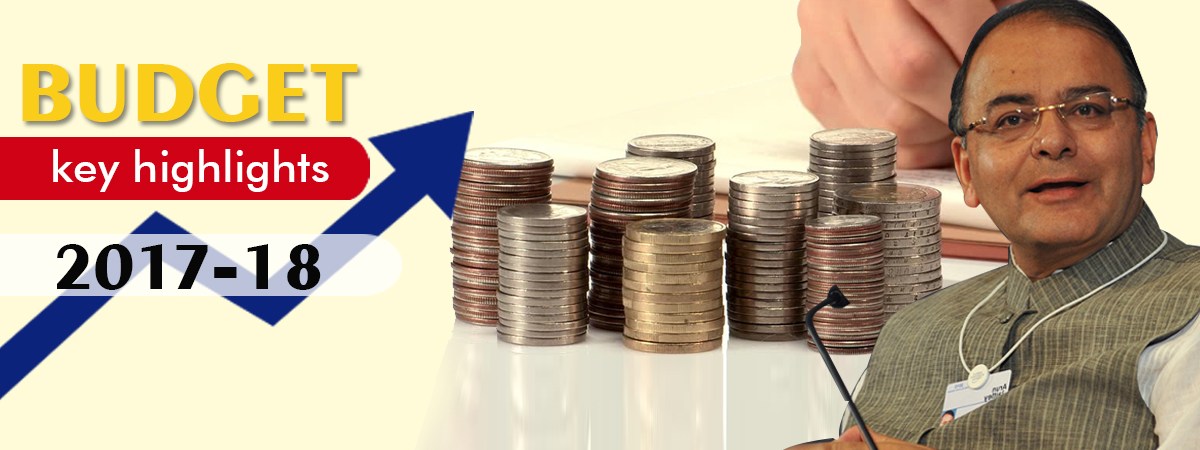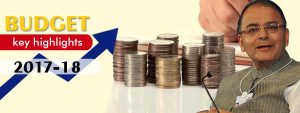Analysis and highlights of Finance Budget 2017- Part 1

Union Finance Minister Mr. Arun Jaitley on 1st of February 2017 announced the most highly anticipated Finance Budget 2017. After demonetisation, a progressive budget was needed to give boost to the overall Indian economy and industrial sector. In the Finance Budget 2017, the government showed their efforts towards cashless economy, incentives to start ups, Make in India projects and harsh penalties for tax evaders.
Highlights of UNION Finance Budget 2017

- Slab rates for individuals below age 60 years, association of person, body of individuals and artificial judicial person (financial year 2017-2018)
| Income Slab | Tax rate % |
| Up to Rs. 250,000 | Nil |
| Rs. 250,001 to 500,000 | 5% |
| Rs. 500,001 to 10,00,000 | 20% |
| Above Rs. 10,00,000 | 30% |
The rebate under section 87A (available to only individual tax payers) which was earlier Rs. 5,000, if the total income doesn’t exceed Rs 5,00,000 is reduced to Rs. 2,500 in case, the total income doesn’t exceed Rs 3,50,000.
- Slab rates for individuals aged more than 60 years but less than 80 years (Financial year 2017-2018)
| Income Slab | Tax rate % |
| Up to Rs. 3,00,000 | Nil |
| Rs. 300,001 to 500,000 | 5% |
| Rs. 500,001 to 10,00,000 | 20% |
| Above Rs. 10,00,000 | 30% |
- Slab rates for individuals aged more than 80 years remains unchanged in the Finance Budget 2017
- Age shall be seen at any time of the year and individual includes both male and female (no separate rates for male and females in this year’s Finance Budget 2017)
- Surcharge under Finance Budget 2017
Before the budget, if the total income of an individual exceeds Rs. 1 crore then surcharge of 12% was applicable. From 2017-2018, surcharge will be applicable as follows:
| Income | Rate |
| Up to Rs. 50,00,000 | Nil |
| From Rs. 50,00,001 to 100,00,000 | 10% of the amount of Income tax |
| Above Rs. 100,00,000 | 15 % of the amount of income tax |
Other provisions regarding surcharge remains the same such as marginal relief (where income exceeds one crore rupees, the total amount payable as income tax and surcharge shall not exceed the total amount payable on total income of one crore by more than the amount of income that exceeds one crore).
- Companies whose gross turnover or total receipts doesn’t exceed Rs. 50 crore in FY 15-16, rate of income tax will be 25% and in all other cases, rate is 30%. Surcharge rates remains the same as it was for FY 16-17.
- Before the budget, a self-employed Individual was able to claim deduction of only 10% of total income under section 80CCD while making a contribution to NPS (National Pension Scheme) however, on the other hand, a salaried person was claiming 20% as employer’s contribution was also allowed as deduction. In the Budget, limit of 10% is increased to 20% for self-employed Individual to bring it at parity.
- Scope of section 194-IB (TDS on payment of rent) has been widened – now, individual and HUFs (other than those covered under Section 44AB) will be liable to deduct TDS@5% if the amount of rent exceeds Rs. 50,000 for a month or part of the month and will be effectively applicable from 01 June 2017.
- Period of holding has been reduced to 24 months from previously 36 months for land and building or both to qualify as long term capital asset.
- Base year for indexation will be shifted to 2001 from 1981 for computation of capital gains from AY 18-19. Consequentially, the cost of acquisition of an asset acquired before 01.04.2001 shall be the fair market value of the asset on 01.04.2001 and the cost of improvement before that date shall be ignored.
- This amendment is applicable only if the assessee is a real estate developer; notional income up to 1 year from the end of financial year in which the certificate of completion is received from competent authority for the property held as stock in trade shall be nil.
- Limit for carry forward and set-off of MAT/AMT credit has been increased from 10 years to 15 years.
- Changes in set-off and carry forward of house property losses:
- House property income can be set off against house property losses in the same year
- House property losses can be carried forward to 8 assessment years to set off against the house property income (setting off in subsequent period is allowed only under same head)
- Setting off of any other income with house property losses is allowed is allowed up to Rs 200,000 only from FY 17-18
- Capital expenditure paid in cash of more than Rs 10,000/- shall be disallowed. Before the budget, there was no threshold on payment of cash for capital expenditure.
- Revenue expense payment in cash has also been limited to Rs 10,000/- which was previously Rs. 20,000/-.
- Changes in 44AD Presumptive Tax Rate are made to promote digital payments in India. Presumptive tax rate has been reduced to 6% from 8%, in case, the amount received through electronic means or cheques only (Presumptive tax rate is applicable if the total turnover or gross receipts in the financial year doesn’t exceed Rs 1 Crore for an individual, HUF or partnership firm).
- If a person receives an amount of Rs 300,000 or more
- In aggregate from a person in a day
- In respect of single transaction
- In respect to transaction relating to one event or occasion from a single person
shall be liable to a penalty of equivalent amount under section 271 DA (to be inserted).
- The option to submit Form 15H/G in case of insurance commission – Earlier, on the payment of insurance commission of more than Rs 15,000/-, a TDS@5% had to be deducted but now Form 15H/G can be filed, under which no TDS shall be deducted.
- In case of business of Call Centres, the TDS rate under Section 194J has been reduced to 2% from existing 10%.
- To plug, the loop hole in tax planning in the budget, the criteria of availing the exemption under section 10(38) has been slightly changed. Exemption is available only if STT has been paid both at the time of sale and purchase, earlier it was on Sale only.
- Change in Penalty provision for delay in Return filing (Previously penalty of Rs 5,000 on delay in filing can be levied on the discretion of Income tax Officer)
- Penalty of Rs 5,000 shall be payable if the return is filed after the due date but before the 31st December of the assessment year
- A fee of Rs 10,000 in all other cases
- In case the total income doesn’t exceed Rs 5, 00,000/-, the fee shall not exceed Rs. 1,000/-.
- A penalty of Rs 10,000/- can be levied on an Accountant, Merchant banker, Registered Valuer in case of furnishing incorrect information in Statutory Report/Certificate.
It is too difficult to compile and present the Budget highlights in one go however we have hereby attempted to cover all under two parts – the second part for the above follows.


 ITAT Amritsar: No Section 269SS Violation for One-Time Cash Payment Before Sub-Registrar
ITAT Amritsar: No Section 269SS Violation for One-Time Cash Payment Before Sub-Registrar  Tax Officials Unleash Digital Dragnet: How New Raid Powers Redefine Privacy, Property Rights in India and likely to Fuel Corruption
Tax Officials Unleash Digital Dragnet: How New Raid Powers Redefine Privacy, Property Rights in India and likely to Fuel Corruption  Income Tax Department Rewards for Reporting Tax Evasion: A Comprehensive Guide
Income Tax Department Rewards for Reporting Tax Evasion: A Comprehensive Guide  Forfeiture of Gratuity by Employer- What are the Remedies for an employee- Can employer be challenged?
Forfeiture of Gratuity by Employer- What are the Remedies for an employee- Can employer be challenged?  Employer can forfeit gratuity of an employee in case of moral turpitude
Employer can forfeit gratuity of an employee in case of moral turpitude  Diving Deeper: The Impact of the New Tax Bill on Dairy and Farming Income
Diving Deeper: The Impact of the New Tax Bill on Dairy and Farming Income